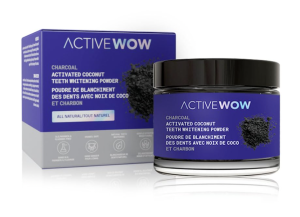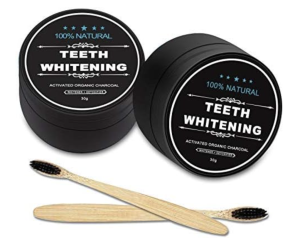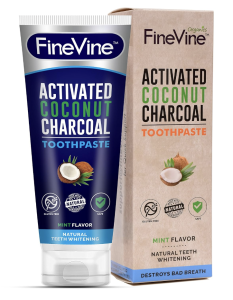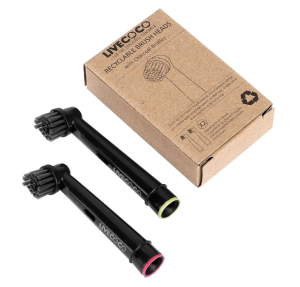So, you’ve heard people raving about using activated charcoal for teeth whitening and a whole load of other things. But does it really work, and how are you supposed to use it?
In the quest to make your teeth whiter, probably the last thing you’d think of is covering them in something black. Still, some people swear by this treatment as a natural way to get whiter teeth – and there’s a good scientific reason why it does work.
Keep reading to find out what’s so special about this type of charcoal and the different ways you can use it in your oral hygiene routine. We have also researched some of the best products available in the US as well as some activated charcoal reviews to take the confusion out of buying this at-home teeth whitener.
In This Article
How does charcoal whiten teeth?
First, let’s be clear that this is NOT the same stuff that’s leftover after a bonfire or available in art shops. Activated charcoal/carbon has special properties because of the way it is produced.
The activation process involves subjecting the charcoal to very high temperatures, either chemically or with steam. This creates tiny, low-volume pores throughout the material which give it a huge surface area.
Here you can see the steps involved with making activated carbon from coconut shells:
Amazingly, just one gram of activated carbon has the surface area of more than 11 tennis courts, thanks to its complex structure.
This surface area lets the charcoal adsorb large amounts of other substances (meaning they stick to the surface of it). Inside your body, it can whisk chemicals and toxins out of your system. When applied to teeth, it encourages plaque, bacteria, and other particles to cling to it so they are all rinsed off together.
Note that teeth-whitening charcoal can only remove stains from the surface of your teeth — although studies show that any whitening may be questionable. Surface stains are often caused by deep-colored foods and drinks, including:
- Tea
- Coffee
- Red wine
- Tomato sauces
- Curries
Charcoal in any form won’t make your teeth whiter than they naturally are. If your teeth are naturally quite yellow or have become discolored because of medication or a health condition, you’ll need to try another form of whitening.
Is activated charcoal safe for teeth?
It’s completely safe to ingest small amounts of activated charcoal. It is commonly used to treat cases of poisoning as it is so good at absorbing toxins before they enter the bloodstream.
Activated carbon is also used in a number of everyday products and processes such as water filters and the decaffeination of coffee. You probably make use of it every day without even realizing it.
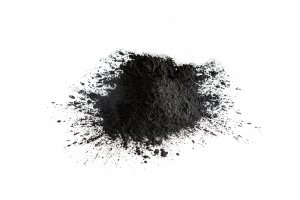
When it comes to brushing teeth with charcoal, especially if you want to whiten teeth with activated charcoal, some concerns have been raised about its abrasive nature. Charcoal is effective at removing surface stains on teeth, but there is also a risk that using charcoal to whiten teeth will erode enamel, too. Our tooth enamel can’t replenish itself, so it’s not a good idea to keep scratching away at it.
As tooth enamel thins, the yellower inner layer of dentin starts to show through. So ironically, teeth whitening with an abrasive method can eventually lead to teeth becoming yellower.
Dentists warn against overuse of whitening toothpastes for the same reason. But, whereas traditional whitening toothpastes rely on brushing to be effective, charcoal pastes can “pull” some stains from the surface without brushing.
Precautions for charcoal teeth whitening
If you’re worried about charcoal teeth whitening damaging your tooth enamel, you can always just apply a paste to your teeth and leave it for a few minutes. Then rinse thouroughly, and brush as normal with your regular toothpaste if you like. Minimize damage by only doing this once a week.
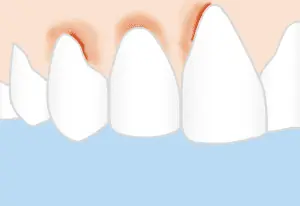
If you notice your gums becoming sore, switch back to your normal toothpaste for a while until they have recovered. Then you can resume applying charcoal – but perhaps do it less often.
Charcoal toothpaste generally doesn’t contain added fluoride (check out our best charcoal toothpaste guide for more info). Some people see this as a benefit as they want to avoid additives. But in actual fact, fluoride is added to most commercial toothpastes because it is effective at strengthening teeth and fighting decay.
You shouldn’t use charcoal if you have any open wounds or ulcers in your mouth. If in doubt, speak to your dentist for a medical opinion. Also check with your dentist before use if you have any teeth implants, veneers or dental crowns. The materials used in these may be less resistant to staining from charcoal.
It’s not safe to inhale the powder, so do be careful when you use it at home.
How to use activated charcoal for teeth whitening
We’ve already established that whitening teeth with charcoal doesn’t mean you can just pick up a bag of charcoal from your local gas station and start rubbing it on your teeth. You can buy medically safe activated charcoal in several different forms from health food shops and online.
These include:
- Powders (both loose and in capsule form)
- Tablets
- Toothpaste
- Whitening strips
- Whitening pens
The tablets are primarily intended for ingestion to treat internal problems. You can, in theory, grind them up and add water to form a paste – but there are much less time-consuming ways to get the same result. Here is a quick overview of some of the products available as well as some charcoal teeth whitening instructions:
Charcoal powder for teeth
We begin our activated charcoal reviews with this charcoal powder. Activated charcoal powder for teeth comes in tins or jars of 60-80g which should last for several months. The fine powder can be mixed with water or other ingredients for using on teeth (more on this below). You can buy it raw – just charcoal powder – or as a pre-mixed powder which contains other ingredients to help with whitening, breath freshness, and so on.
The best powdered activated charcoal teeth whitener
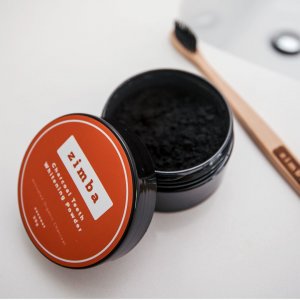
If it’s raw charcoal teeth whitener you’re after, we recommend Zen Charcoal’s food grade powder. They use hardwood trees grown in the US, and the powder is finely ground to make it suitable for a number of internal and external purposes, including tooth brushing and face masks.
One criticism of this product is the packaging, which some users found hard to re-seal once opened. As you can see, the powder is packaged in a pouch rather than a jar. It comes with a free scoop, but there is no guarantee this will be sitting neatly on top when you open it!
Other feedback is largely positive, though, and the manufacturer offers a 30-day money-back guarantee just in case.
For a blended natural teeth whitening charcoal powder, the clear winner in terms of online reviews is Active Wow. This Active Wow teeth whitening charcoal powder is natural and contains bentonite and orange seed oil in addition to organic activated coconut charcoal. The additional ingredients help with remineralization, whitening, and anti-inflammation.
Users report quick results with this Active Wow teeth whitening charcoal, even on teeth stained from coffee, tea, and smoking. “It doesn’t give you the super white look, it looks natural and clean”, says one reviewer. “After 5 days, I’m stunned. My teeth are less sensitive, translucent spots are less noticeable or gone, and my teeth are shades whiter”, is the comment from another.
A handful of users do report problems with tooth or gum sensitivity, but this seems common to most products of this kind.
Another popular blended product is Nimiah’s activated charcoal teeth whitening powder. This activated charcoal teeth whitener is mixed with bentonite, organic orange peel extract, and organic mint extract for extra whitening and freshness.
In one of the charcoal teeth whitening reviews, a customer says that it works quickly and is really messy:
“Bought this about a month ago and wanted to see how well it worked. I absolutely love it but as others will say be careful with it, also it stained one of my towels but that might’ve been my bad. Any-who, it works perfectly but I’d suggest doing it max 4 times a week since my gums were sore after 3 weeks. Best advice is brush with toothpaste, use this, and brush your teeth after with mouth wash to get the rest out since it does sit at the gums. It does have a bit of high school locker room taste”
How to make homemade charcoal toothpaste
Charcoal is an abrasive mineral, and when scrubbed onto the teeth with a toothbrush for activated charcoal teeth whitening, can actually do more damage than good.
The best use for activated charcoal is for maintaining the whiteness of tooth whitening treatments provided by your dentist. To get the benefits of brushing teeth with charcoal, you can buy activated charcoal pellets from a health food store and crush them with a mortar and pestle, or use a few teaspoons of powder. Add a tiny bit of water and stir. Add more water (a little at a time) until you end up with the consistency of toothpaste.
Here’s the important part: Use only your finger to gently rub the paste on your teeth. Then rinse your mouth with water, swish it around then spit it out — no swallowing! Store any leftover paste in an airtight container in the fridge.
Do Not:
- Put activated charcoal paste on a brush
- Let the activated charcoal get rubbed into your gums
Remember, activated charcoal is very abrasive, a little bit goes a long way. Think of it as something to use weekly, not every single day.
Dr. Nammy Patel, Green Dentistry, SF
Some people prefer to mix the charcoal with coconut oil because of its anti-bacterial properties.
You can also purchase a premixed charcoal paste, which is much less messy. You simply apply it to your toothbrush as you would with your regular toothpaste. Some people also prefer a toothpaste because of the familiar taste and texture.
FineVine Activated Coconut Charcoal Toothpaste is one of the best teeth whitening charcoal products according to reviewers on Amazon, and it’s made with all-natural ingredients. As well as coconut charcoal it contains coconut oil, baking soda, and peppermint oil.
Our guide to natural toothpastes has more details about some other natural options you might like to consider – both store-bought and homemade.
You can also read all about the best whitening toothpastes, including charcoal teeth whitening options, in our full guide here.
Other activated charcoal teeth whitening products
Activated charcoal floss
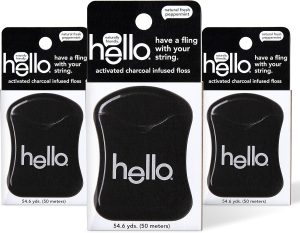
You can add extra whitening and cleaning oomph to your oral hygiene routine with charcoal floss like this one made by Hello.
It is made from 100% bamboo fiber and has a natural wax coating, so it won’t get caught or shred. The activated charcoal helps absorb more plaque and enhances cleaning, and may even help you whiten between your teeth in those especially hard-to-reach places.
Toothbrushes for charcoal whitening
Charcoal toothbrushes are not actually made from the mineral itself, but the bristles are infused with it. The brush, therefore, takes on some of the adsorption properties to pull bacteria and plaque from your teeth.
There is no scientific evidence to show that these toothbrushes are more effective at cleaning and whitening, especially over time. Again, use caution when using any sort of toothbrush combined with charcoal.
Many varieties come with an eco-friendly, biodegradable bamboo handle, but plastic handles are also available. You can also get a charcoal fiber toothbrush head to fit an Oral-B electric toothbrush!
Activated charcoal whitening products comparison
Below you’ll find a table to summarize and compare some of the products we’ve discussed in this article, so you can find out how to whiten teeth with activated charcoal in a way that fits your lifestyle.
Pros | Cons | Price | |
Zen Charcoal | Food grade, good value, fine texture | Messy, packaged in a pouch | |
Active Wow | Good results, has remineralizing properties | Messy to use, may cause sensitivity | |
Nimiah | Organic ingredients, fast results according to customers | Messy to use, may cause sensitivity | |
Oral-B brush head | Charcoal-infused bristles | Less noticeable results | |
Finevine | All-natural ingredients, fresh taste | Can be messy, no fluoride |
Activated charcoal teeth whitening reviews
Before we close, let’s have a look at some teeth whitening charcoal reviews from a couple of oral health professionals.
First up, Dr. Greg Kantor shares his charcoal teeth whitening review in the video below. He says that charcoal can indeed whiten teeth, but if you want to brush your teeth with activated charcoal, you should only do it once every three to six months. More frequently, and you’re bound to damage your teeth.
This next charcoal teeth whitening review is from dental hygienist Whitney, who tries out charcoal powder. She says she does notice that her teeth do seem to be a bit whiter after using it, but she advises approaching brushing your teeth with activated charcoal with plenty of caution.
Conclusion
Acitvated charcoal is a non-peroxide whitening alternative that you can use on your teeth in the form of a powder, toothpaste, or strip. There are benefits and drawbacks to each of these products, so experiment (with caution) to see what works best for you.
Keep in mind that that the only way to get your teeth whiter than their natural shade is with teeth bleaching. Many dentists offer professional teeth whitening in-office, but for a cheaper option, the best teeth whitening kits can produce good results.
Above all, if you are going to brush your teeth with activated charcoal, do so infrequently, (two to four times per year), and use a brush with extra soft bristles. Also keep in mind that many dentists say you shouldn’t even brush, you should simply let the charcoal paste rest on your teeth.
Remember that the best way to keep your teeth clean and healthy is to visit your dentist and hygienist regularly. If you have any underlying oral health issues, any whitening treatment or similar dentistry procedures may aggravate them and cause pain or sensitivity.
FAQs
Does activated charcoal really whiten teeth?
Activated charcoal can whiten surface stains, or extrinsic stains. That includes stains on your teeth caused by the usual culprits like wine, coffee, berries, and dark chocolate. Intrinsic stains, or those that come from within the tooth can only be lightened with bleaching treatments.
Is charcoal bad for your teeth?
There are concerns that charcoal toothpaste can erode your enamel, making teeth more sensitive and increasing the risk of decay. When enamel weakens, it exposes more of the yellow dentin underneath. This can make teeth appear less white. So is charcoal teeth whitening safe? When used with caution and sparingly, it can be, yes. You should always use a soft-bristled toothbrush, and to be extra safe, you may just want to let the paste sit on your teeth instead of brushing with it.
How does charcoal whiten your teeth?
Activated charcoal is very porous and has a huge surface area. This surface area gives the charcoal the ability to adsorb other substances (meaning they stick to the surface of it). When used on teeth, activated charcoal can encourage plaque, bacteria, and stain particles to cling to it, taking them with it as its rinsed off.
NIH: Effects of activated charcoal powder combined with toothpastes on enamel color change and surface properties. Consulted 6th February, 2023.






